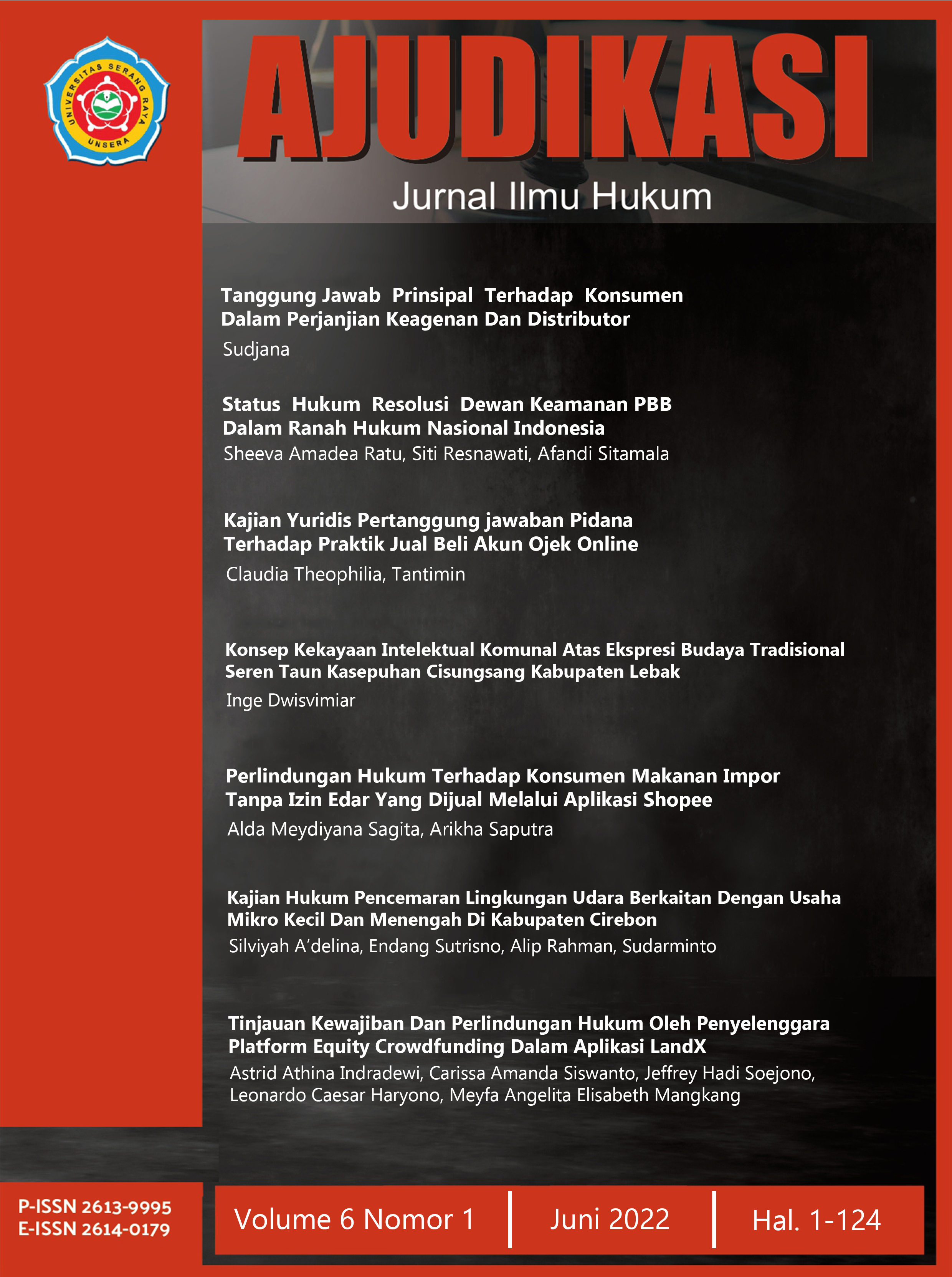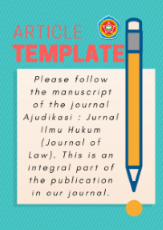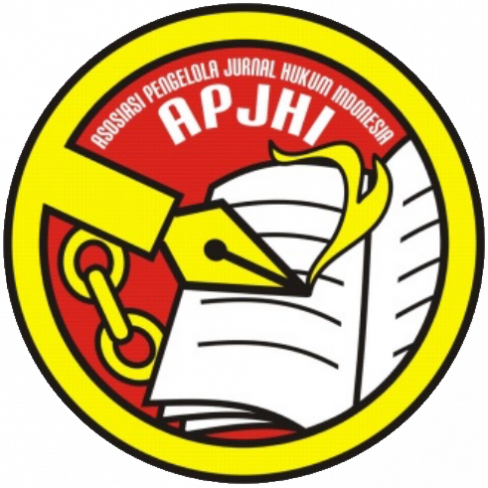Kajian Yuridis Pertanggungjawaban Pidana Terhadap Praktik Jual Beli Akun Ojek Online
 Abstract views: 434
,
Abstract views: 434
,
 PDF BAHASA INDONESIA downloads: 499
PDF BAHASA INDONESIA downloads: 499
Abstract
The digital economy is the part of the economy that enables and conducts trade in goods and services through electronic commerce on the Internet. It is also referred to as the internet economy or online economy, because many digital service providers use the internet to provide services to end users including online motorcycle taxis. The internet-based online motorcycle taxi business makes it easy for passengers who need transportation. With just one click on the smartphone and having the application of that system, then one can order a motorcycle taxis and taxis, even now, there are many new features, namely online food ordering and online services. However, in addition to the convenience, there is a practice of buying and selling accounts by drivers that can harm passengers. The purpose of this paper is to find out how the criminal liability for the practice of buying and selling motorcycle taxi accounts online. The research method conducted by the author is a qualitative normative research. The results show that the working relationship between the driver and the application provider is a mutually beneficial partnership relationship. The application provider prohibits account buying and selling transactions, thus the sanctions that can be given to perpetrators are suspension and breaking up of partners. Meanwhile, criminal liability by the perpetrator can be charged under Article 35 jo. Article 51 paragraph (1) of The Electronic Information and Transaction Law.
Downloads
References
Buku :
Ibrahim, Johnny. Teori Dan Metode Penelitian Hukum Normatif. Malang : Bayumedia Publishing, 2005.
Soekanto, Soerjono. Penelitan Hukum Normatif. Jakarta : Rajawali, 2015.
Suprihanto, John. Hubungan Industrial Sebuah Pengantar. Yogyakarta : BPFE, 1986.
Jurnal :
Button, Kenneth. “The ‘Ubernomics’ of Ridesourcing: The Myths and the Reality.” Transport Reviews 40, no. 1 (2020). https://doi.org/10.1080/01441647.2019.1687605.
Chua, Evelyn L, Jason L Chiu, and Nelson C Bool. “Sharing Economy: An Analysis of Airbnb Business Model and the Factors That Influence Consumer Adoption.” Review of Integrative Business and Economics Research 8, no. 2 (2019).
Fillaili, Nuraini. “Tanggung Jawab Perusahaan Transportasi Online Terhadap Penumpang Akibat Adanya Praktik Peralihan Akun Driver.” Jurist-Diction 2, no. 4 (2019): 1375. https://doi.org/10.20473/jd.v2i4.14499.
Gandini, Alessandro. “Labour Process Theory and the Gig Economy.” Human Relations 72, no. 6 (2019). https://doi.org/10.1177/0018726718790002.
Gomes, Silvia Bogea, Flavia Maria Santoro, Miguel Mira Da Silva, and Maria Eugenia Iacob. “A Reference Model for Digital Transformation and Innovation.” In Proceedings - 2019 IEEE 23rd International Enterprise Distributed Object Computing Conference, EDOC 2019, 2019. https://doi.org/10.1109/EDOC.2019.00013.
Laurell, Christofer, and Christian Sandström. “Analysing Uber in Social Media - Disruptive Technology or Institutional Disruption?” International Journal of Innovation Management 20, no. 5 (2016). https://doi.org/10.1142/S1363919616400132.
Rogers, Rachel Botsman and Roo. “What’s Mine Is Yours: The Rise of Collaborative Consumption.” Choice Reviews Online 48, no. 06 (February 2011): 48-3364-48–3364. https://doi.org/10.5860/choice.48-3364.
Silalahi, Shilvia L.Br, Putu W. Handayani, and Qorib Munajat. “Service Quality Analysis for Online Transportation Services: Case Study of GO-JEK.” In Procedia Computer Science, Vol. 124, 2017. https://doi.org/10.1016/j.procs.2017.12.181.
Trabucchi, Daniel, Tommaso Buganza, Laurent Muzellec, and Sébastien Ronteau. “Platform-Driven Innovation: Unveiling Research and Business Opportunities.” Creativity and Innovation Management 30, no. 1 (2021). https://doi.org/10.1111/caim.12428.
Weng, Gooi Sai, Suhaiza Zailani, Mohammad Iranmanesh, and Sunghyup Sean Hyun. “Mobile Taxi Booking Application Service’s Continuance Usage Intention by Users.” Transportation Research Part D: Transport and Environment 57 (2017). https://doi.org/10.1016/j.trd.2017.07.023.
Yunhan Liu, Dohoon Kim. “Why Did Uber China Fail in China? – Lessons from Business Model Analysis.” In The 22nd Biennial Conference of the International Telecommunications Society: “Beyond the Boundaries: Challenges for Business, Policy and Society,” 2018.
Peraturan Perundang-Undangan :
Undang-Undang Republik Indonesia Nomor 22 Tahun 2009 Tentang Lalu Lintas dan Angkutan Jalan.
Undang-Undang Republik Indonesia Nomor 19 Tahun 2016 Tentang Perubahan Atas Undang-Undang Republik Indonesia Nomor 11 Tahun 2008 Tentang Informasi dan Transaksi Elektronik.
Peraturan Pemerintah Nomor 74 Tahun 2014 Tentang Angkutan Jalan.
Website/Internet :
Hadi Pratama, Aditya. “Kilas Balik Perkembangan Ojek Online Di Indonesia Sepanjang 2015,” 2015.
Lora, Vivian. “Tinjauan Hukum Terhadap Perjanjian Kemitraan Antara PT. Gojek Indonesia Cabang Medan Dengan Driver Gojek,” 2018.
All articles in Ajudikasi : Jurnal Ilmu Hukum can be disseminated provided they include the identity of the article and the source of the article (Ajudikasi : Jurnal Ilmu Hukum). The publisher is not responsible for the contents of the article. The content of the article is the sole responsibility of the author
Ajudikasi : Jurnal Ilmu Hukum is lincensed under a Creative Commons Attribution-ShareAlike 4.0 International License.





1.png)
.png)
.png)




.png)
.png)
.png)
.png)





.png)







